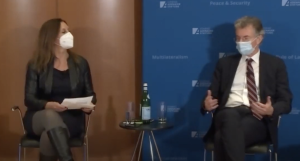With a growing assertiveness and power projection of China under Xi Jinping, the value-based liberal world order as enshrined in the UN Charta faces tremendous challenges and needs defendants as Germany who stand up for democratic principles and human rights. In addition, a strong ally, the United States, became in those two years, the last two years of the Trump administration, an unpredictable and often self-centred actor.
The conflicts on the agenda of the Security Council, and particularly the crisis situations in Libya, Syria/Iraq and Yemen also changed their character through an increased involvement of external actors and players with seats on the Council. This has not only been counterproductive for finding political solutions to the crisis but also hampered the delivery of much needed humanitarian assistance.
As co-penholders for the humanitarian assistance dossier in Syria, the team of Ambassador Heusgen had to negotiate hard for what should be a given – access to those who are the victims and in need. But also as co-penholders on Afghanistan, Sudan and chairs of the sanctions committees for Libya and North Korea, Germany took over important roles as a non-permanent member in order to shape the Council’s agenda.
Panelists included Her Excellency Ambassador Alya Al-Thani, the Permanent Representative of Qatar. Qatar is not only the current host of the Afghan peace talks between the Afghan government and the Taliban. Qatar also played mediating roles in the Darfur conflict in Sudan.
Estonia currently serves with Belgium and Germany as the third European elected member on the Security Council. Ambassador Sven Juergenson will have another year on the council when he will be joined by the European members Norway and Ireland. During its presidency in May 2020, Estonia had to face the geopolitical tensions between the US and China when it tried to bring forward a UN Security Council Resolution on COVID in support to the Secretary General’s call for a global ceasefire.
The fourth panellist was Karin Landgren, Executive Director of the Security Council Report. Security Council Report is an independent think tank that monitors closely the work and the dynamics in the Security Council in order to enhance the transparency, accountability and effectiveness of the Council. Karin Landgren served for the UN for over 35 years. She was the first woman heading three UN peace-keeping operations: respectively Liberia, Burundi and Nepal.
Ambassador Olof Skoog, the Head of the EU Delegation joined virtually due to the quarantine restrictions of NY State after travels. Having served as the Swedish Permanent Representative to the United Nations between 2015 and 2019, he also represented Sweden on the Council. Thus, he could share his personal insights from a national perspective but could also draw attention to the need to find a European voice on foreign and security policy issues.
The panel discussion was moderated by Ms Antje Passenheim, head of the German public radio station ARD in New York.




